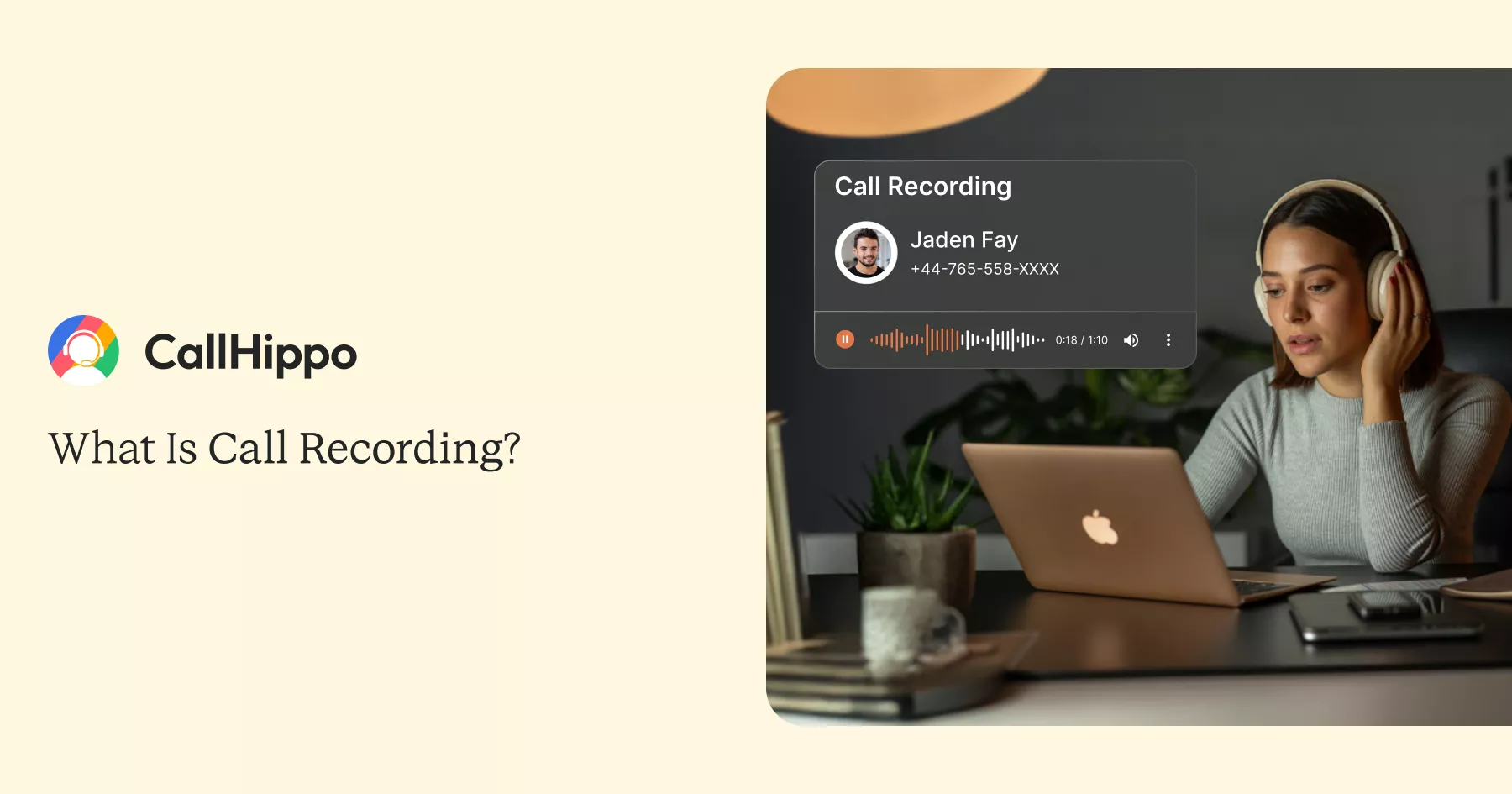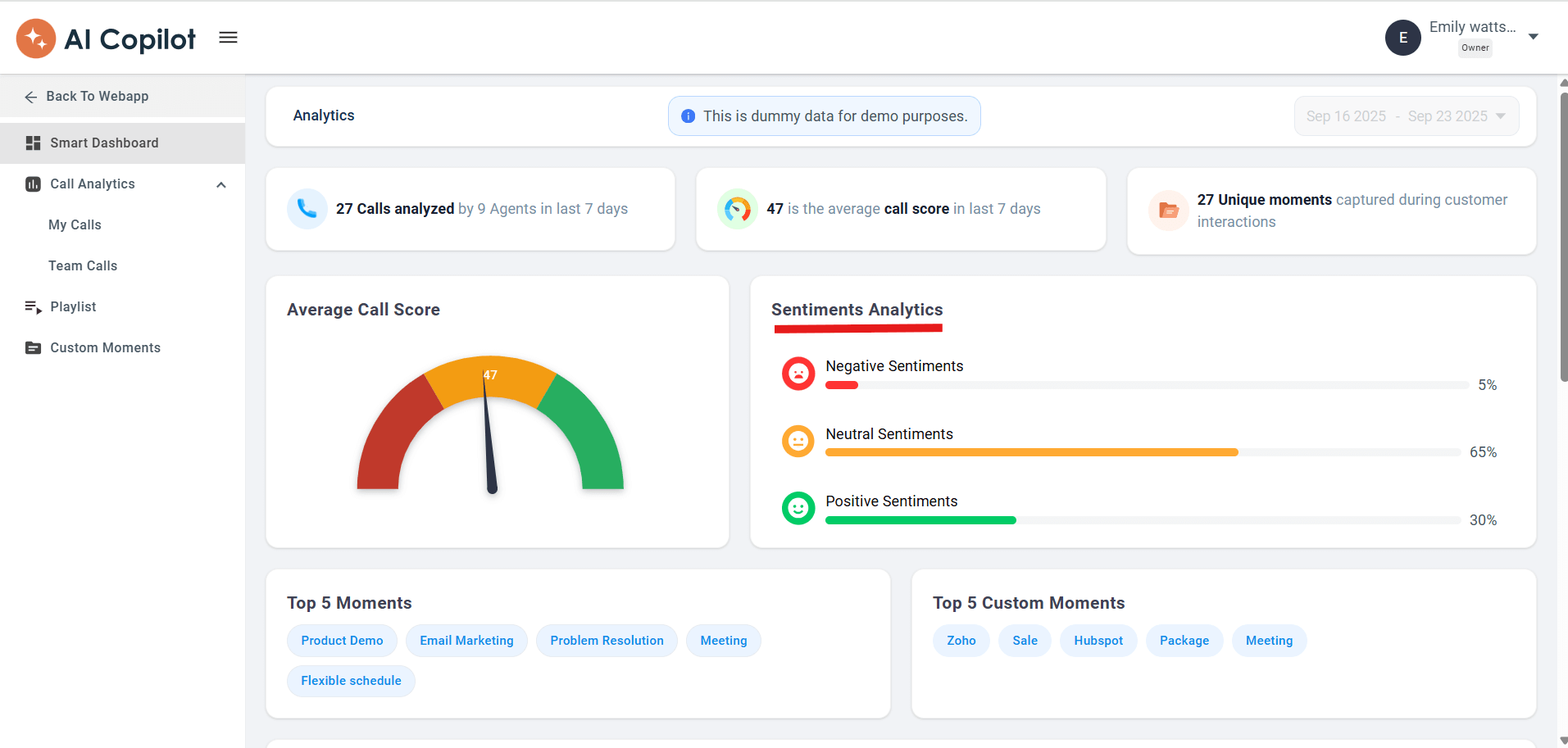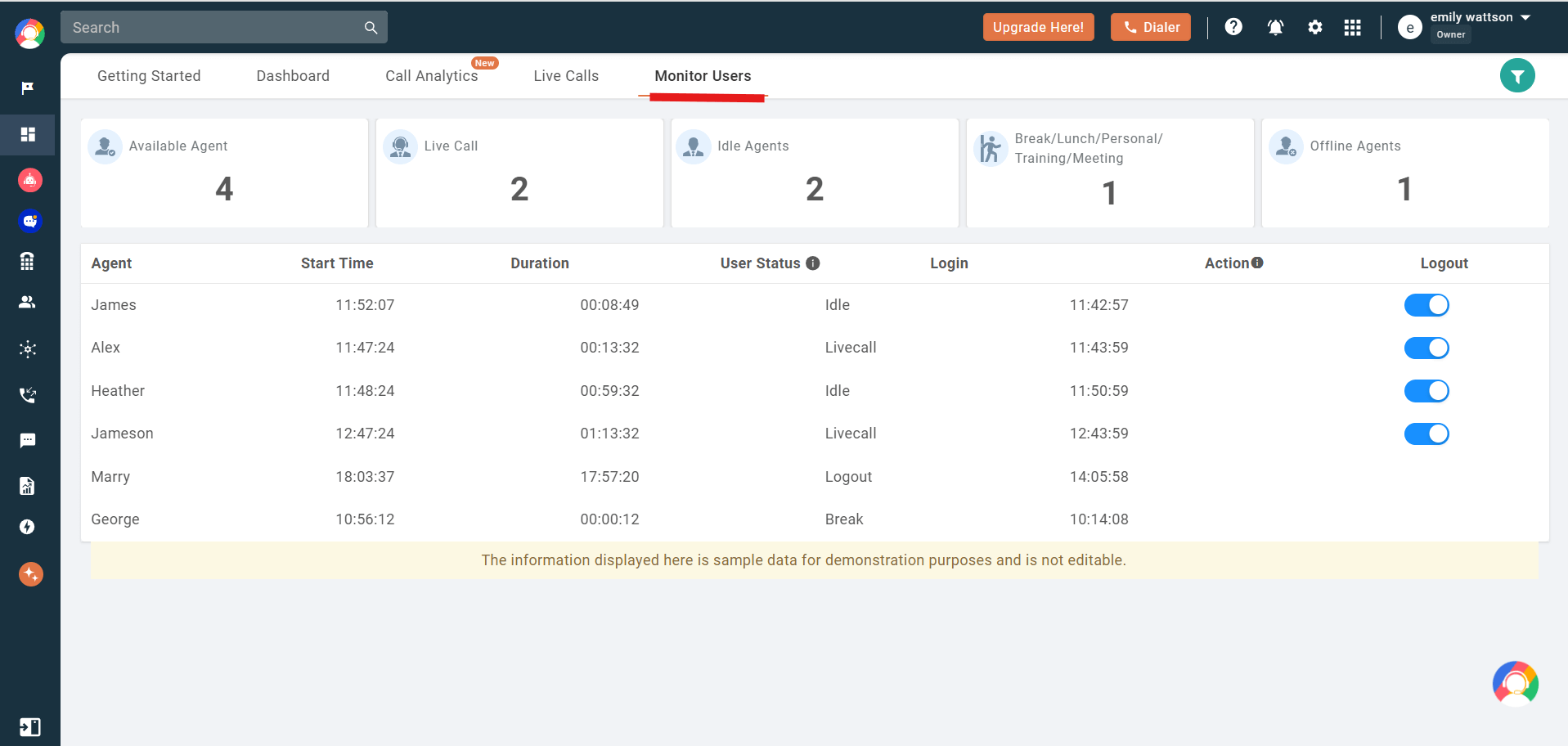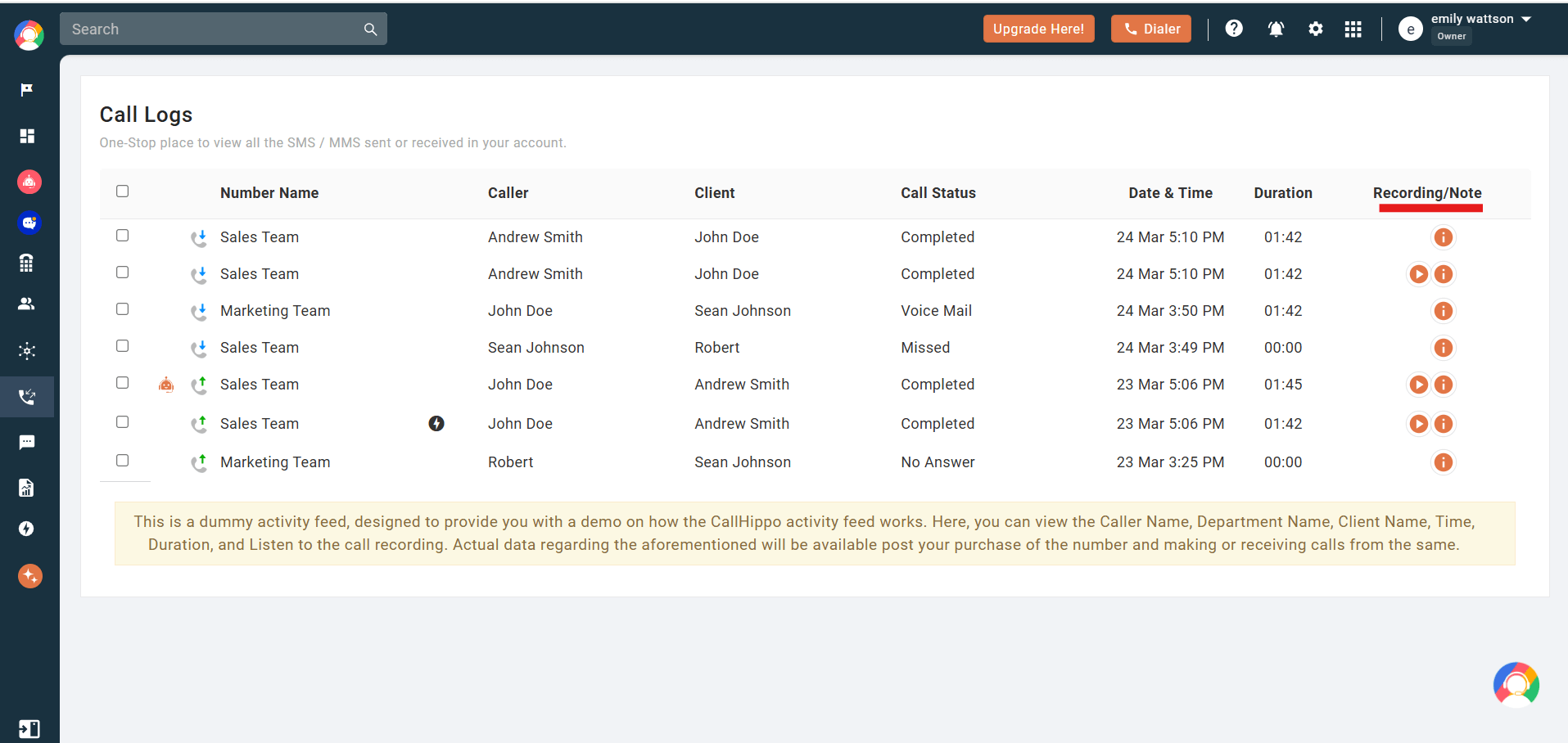

Updated : October 16, 2025
Ever wished you could replay an important call to catch every detail you missed? That’s exactly what call recording helps you do. It lets businesses review conversations, train employees, and stay compliant while improving customer service. 73% of businesses worldwide have adopted automatic call recording to boost service and efficiency.
In this blog, we’ll explore what call recording is, how it works, and why it’s becoming an essential tool for modern businesses that care about accuracy, quality, and trust.
What Is Business Call Recording?
Call recording is the process of saving phone conversations so they can be reviewed later. Businesses use it to monitor how teams interact with customers, train new employees, resolve disputes, and maintain accurate records of important discussions. These business call recordings are stored securely so authorized users can easily access them whenever needed.
Recording calls also helps ensure accuracy and accountability. Managers can review real conversations to evaluate performance, identify areas for improvement, and handle customer complaints fairly. When stored properly, VoIP call recordings become valuable tools for training, quality control, and legal protection in day-to-day business operations.
How Does Call Recording Work?
The recording process captures audio when incoming calls and outbound calls happen, then saves them digitally or on servers. Systems like CallHippo do this automatically; they record calls, mark when they happened, and store them safely. This helps you go back and check conversations, keep quality up, and follow legal compliance rules.
Many companies link their recorded calls to their CRM or analytics tools. This helps improve customer experiences and customer support. You need to get permission from people, let them know they’re being recorded, and keep everything secure. Cloud solutions like CallHippo let you access recordings from your phone or computer anywhere.
KNOW MORE
Explore features like predictive compliance alerts, AI-powered transcription, and sentiment analysis to make call recordings smarter.
Types of Call Recording
Call recording have different types of work in different ways. Pick the one that fits how your business operates.
1. On-Demand Recording
With on-demand recording, you choose when to record. You tap start recording when something important comes up, then tap stop recording when you’re done. This means you’re not filling up storage with boring everyday calls, just the ones that matter. Perfect for sensitive information where you don’t need to record everything. Just press the record button when you need it.
2. Automatic Recording
An automatic call recorder does all the work. Every incoming and outgoing call is automatically saved without you having to do anything. Nothing gets missed, which is great for legal compliance, checking quality, or training. You can listen to calls whenever you want to keep good records and improve how your team works.
3. Selective Recording
Selective recording is somewhere in between. You tell the system to only record phone calls from certain numbers, departments, or types of calls. This recording solution saves space because you’re only keeping what you actually need. It gives people some privacy while still letting you monitor the important stuff.
4. Screen & Call Recording Combination
This records both what’s being said on the call and what’s happening on the computer screen. It’s really helpful for support teams, sales demos, and training because you get the full picture, both the conversation and what actions were taken. Having both pieces means you understand exactly what happened during customer interactions.
Benefits of Call Recording for Businesses
A phone call recorder helps businesses work better, train people faster, stay legal, keep customers happy, and learn from real conversations.
1. Improves Agent Training & Quality Assurance
Call recordings let you train your team with actual examples from real calls. You can see how they’re doing and make sure everyone’s giving good service. Your team can hear their own conversations through playback and spot where they can do better.
2. Enhances Customer Experience
When you go through recorded calls, you learn what customers really want and can fix problems faster. The customer recording service helps you pay better attention to each person, making them happier and more likely to return.
3. Ensures Compliance & Dispute Resolution
Audio files work as proof for staying legal. They help you sort out arguments or confusion with accurate records that your team can access anytime. No more wondering who said what.
4. Provides Business Insights & Performance Analytics
Recorded calls show you what’s happening, patterns in customer behavior, how your agents perform, and what problems keep coming up. This gives you real information to make better decisions.
IMPORTANT TIP
Always inform callers before recording. This not only keeps you legally compliant but also builds trust with your customers.
Key Features of a Call Recording System
A reliable business phone system with call recording should include features that let you easily capture, organize, and review calls while ensuring complete data security.
1. Multi-Channel Support
Multi-channel support means you can record calls no matter where they come from; landlines, internet calls, mobile devices, etc. All customer interactions get saved the same way, so you can review everything together.
2. Tagging
Tagging is how you organize stuff. Label recorded calls by what kind they are, which department handled them, or what topic they’re about in your recording settings. It means finding specific conversations in your log much faster when you need to look something up.
3. Secure Cloud Storage
Secure cloud storage keeps your recorded calls safe and easy to reach. You can download or play recordings whenever you want. Some people also save files to Google Drive. The main thing is to keep recordings private and meet whatever legal standards apply to your business.
4. AI-Powered Transcription and Sentiment Analysis
AI transcription turns calls into written text and figures out the mood of the conversation. This helps you understand how customers feel, notice patterns, and improve service without having to listen to every full recording yourself.


5. Call History
Call history saves all the info about past calls: when they happened, how long they lasted, and who was on them. It can easily look stuff up quickly, see how people are doing, and keep a better track of customer relationships for your team.
6. Call Parking
Call parking lets you put a call on hold and pick it back up from a different device or extension. Handy when things get busy and you need to move calls around.
7. One-Click Recording
One-click recording is simple. You start recording right away during a call without dealing with complicated settings. Important conversations are easily saved for any user.
8. Call Monitoring
Call monitoring allows to listen to live calls to check quality, train staff, and support agents when needed. Keeps everyone giving the same level of service.


Legal & Compliance Considerations
Call recording needs to follow laws and regulations to protect privacy, get permission from people, and stay compliant with data rules.
1. Consent Requirements
Before you record, you need permission from the people on the call. Most states have one-party consent rules, but some require everyone to agree. If you skip getting consent, you could get in legal trouble. The caller should know they’re being recorded. Clear rules and notices keep you compliant and honest.
2. GDPR, HIPAA, and PCI DSS Compliance
You have to follow regulations like GDPR, HIPAA, and PCI DSS when you record calls. These laws control how you save data, keep it secure, and who can see it. They protect personal details, medical records, and payment information. Following these keeps you legal and protects customer data.
3. How to Notify Callers Legally
Tell callers about recording through announcements, automated messages, or written permission. Doing this right keeps things open and protects privacy. Clear communication helps customers trust you.
Best Practices for Call Recording
Following smart practices with VoIP call recording keeps you legal, protects sensitive information, makes customers happier, and improves how you communicate.
1. Get Consent Clearly and Upfront
Always tell everyone before recording calls. Get clear permission – either spoken or written – to follow local laws. CallHippo makes it simple to notify people automatically, which keeps your business safe legally and maintains customer trust in every conversation
2. Set Retention Policies
Decide how long recordings stay in your system based on what you need and what the law says. CallHippo lets you manage this easily, making sure old recordings get deleted safely. This saves storage space and helps you follow privacy rules.
3. Encrypt and Protect Recorded Data
Keep recorded calls secure with encryption and protected storage. CallHippo uses cloud-based encryption to stop people who shouldn’t have access from getting in, protecting customer data, and making sure recordings stay private and legal.
4. Regularly Review Recordings for Quality
Check recorded calls often to see how agents are doing and how customer talks are going. CallHippo makes playback and review easy, so managers can maintain high service quality and make customers happier over time.
5. Train Agents on Call Recording Compliance
Teach your employees about the laws and company rules for call recording. CallHippo’s platform helps teams follow the rules, handle recorded calls correctly, and avoid getting in trouble while staying professional and keeping customer trust.
DID YOU KNOW?
- Call recordings can be used as legal evidence lin disputes or compliance audits.
- AI transcription can save hours of manual note-taking by converting calls into readable text instantly .
Proactive Compliance Alerts: Real-Time Detection of Risky Phrases
Proactive compliance alerts monitor live calls and catch risky phrases immediately to avoid legal problems and ensure you’re following company rules and industry standards.
1. How AI Detects Risky Phrases in Real Time
AI systems use language processing to check live calls. They look for specific words, phrases, or patterns that might mean someone’s breaking the rules. The system picks up on hints in speech, tone, or the topic being discussed and marks conversations that need attention. This stops mistakes before they become bigger problems.
Managers or compliance teams get alerts right away when risky language shows up. They can step in immediately, help agents, or fix things while the call is still happening.
For example, if an agent says “We guarantee 100% returns”, the AI instantly flags it as risky and alerts managers to step in right away.
Common Use Cases of Call Recording
Call recording gets used in different industries to make service better, stay legal, monitor performance, and keep accurate records of business talks.
1. Call Centers and Customer Support Teams
- Record customer calls to watch how agents do their job and keep service good.
- Use recordings to settle arguments or clear up confused conversations.
- Train new agents with real recorded calls so they learn from actual examples.
- Keep a history of calls to spot recurring issues with customers.
2. Sales and Telemarketing
- Capture sales calls to see how well pitches work and track how many deals close.
- Review calls to find what works and share it with the whole team.
- Track what objections customers bring up and how agents respond to improve scripts.
- Watch compliance with laws for cold calling and marketing.
3. Healthcare and Finance Compliance
- Record calls to keep accurate patient or client information safe.
- Make sure conversations follow HIPAA, GDPR, or financial laws.
- Give audit trails for reviews and government checks.
- Protect sensitive financial or medical data during phone talks.
4. Legal and Dispute Management
- Save call recordings as proof for legal cases and settling disputes.
- Check verbal agreements and promises to avoid confusion.
- Help investigations by giving accurate records of conversations.
- Increase accountability and openness during business or client talks.
Choosing the Right Call Recording Software
Picking the right recorder app matters for running your business well, staying legal, and giving customers a better experience.
1. Factors to Consider
When picking a recording app, think about call quality, where recordings get stored, and if it’s easy to use. Check if it works with your CRM and if it’s secure. Make sure it meets industry regulations and look at what it costs. Pick something that fits your business and gives you value with no extra charge for basic stuff.
2. Cloud vs Local Storage Options
Cloud-based call recording gives you flexibility. You can get to recordings from anywhere and it works well with other tools. Local storage gives you more control over sensitive data and might be better if you have strict privacy needs. Think about what your business needs when choosing.
3. Comparison of Top Call Recording Tools
Different recording solutions have different features depending on your business size and what you need. Each tool has its own benefits like how much it stores, what it connects with, and how it handles compliance. Pick the one that fits your business best.
CallHippo
CallHippo has an easy cloud-based call recording solution with things like call analytics, automated transcription, and CRM connection. It works on iPhone, Android device, and other devices, keeping everything secure and legal. Good choice for customer service teams of any size.




Need To Manage Your Call Recording?
Try CallHippo free and experience smarter, safer, and more efficient call management.
bottom circle
RingCentral
RingCentral gives you cloud-based call recording with unlimited storage. It connects well with business tools and has advanced analytics and reports. Good if you want strong communication options with flexibility.
Dialpad
Dialpad is a modern call recording platform with AI, real-time transcription, and voice analytics. It works well with CRMs and productivity tools, giving you advanced features. The interface is easy to use and it grows with your organization.
Aircall
Aircall is a cloud-based call recording system made for customer support teams. It connects easily with popular CRMs and helpdesk tools. Easy to use and grows with you, making it great if you need good call management without complicated setup.
Future of Call Recording
The future of call recording is about AI insights, real-time analytics, predicting compliance issues, and connecting all communication channels to work better, improve customer experience, and follow regulations.
1. AI and Real-Time Analytics
AI systems check live calls to spot patterns, trends, and problems right away. Managers can help agents during conversations for better results. This makes performance better, keeps quality steady, and gives you useful info for improving how you communicate with customers.
Real-time analytics also help make the process better, find where training is needed, and watch how agents do continuously. When you use AI insights, you can work faster, solve problems quicker, and keep service standards high. Every customer interaction becomes productive, follows the rules, and helps your business grow over time.
2. Voice-to-Text and Sentiment Analysis
Voice-to-text technology turns calls into written transcripts. This lets you do sentiment analysis that shows customer emotions, concerns, and what they prefer during conversations. Agents can respond better, improve service, and give personalized help while making sure customers feel heard.
Sentiment insights also give managers useful data to improve strategies, train employees, and make customer experience better overall. You can spot trends, handle issues that keep happening, and measure how satisfied people are. Every interaction becomes a chance to improve engagement and loyalty across all customer communication.
3. Predictive Compliance Monitoring
Predictive compliance monitoring catches risky phrases, language that breaks rules, or potential violations during live calls. Alerts happen right away so you can step in immediately. This helps stop issues before they get worse and keeps you following legal and internal standards.
When you use these tools, you reduce legal risks and keep trust strong. Watching things continuously also helps improve policies, train agents, and keep things running properly while creating a safe, compliant, and professional environment for customers and employees.
4. Integration with Omnichannel Communication
Future call recording systems work with chat, email, social media, and other channels . This gives you one view of all customer interactions. The global call recording market is projected to grow significantly, from an estimated $369.5 million in 2024 to $1,017.4 million by 2030, representing a Compound Annual Growth Rate (CAGR) of 19%.
This connection gives you full analytics, personalized responses, and better oversight. When you bring communication channels together, you improve teamwork and make workflows smoother. Customer experience gets better while making sure every interaction is documented, watched, and improved for long-term business growth.
FAQs
1. Is it legal to record customer calls?
Call recording is legal if you follow local laws and get permission. CallHippo keeps you legal by letting you notify people before recording. This keeps things open, avoids legal trouble, and protects customer privacy while saving calls for training or quality checking.
2. What’s the difference between cloud and local recording?
Cloud recording saves calls online where you can get to them anytime. Local recording saves calls on physical devices. CallHippo offers cloud-based recording with security, easy access, storage that grows with you, and connection with other business tools. This makes managing recorded calls easier.
3. How do I notify customers that calls are recorded?
Tell customers at the start of a call, either by saying it or through an automated message. CallHippo lets you customize notifications so everyone knows they’re being recorded. This keeps your business open, legal, and trustworthy in every conversation.
4. Do I have to pay more for call recording?
Pricing varies depending on who you use and what features you get. CallHippo includes call recording in its plans with good prices and no hidden costs. This makes it work for businesses of all sizes while keeping recordings secure and high-quality.
Published : October 13, 2025

Shubham Nikam, Senior Product Marketing Specialist, brings 5 years of experience in VoIP demand generation and lead generation. He specializes in B2B SaaS, focusing on cloud telephony and CCaaS. Shubham excels in developing go-to-market strategies, optimizing product messaging, and leveraging AI tools to drive growth and customer acquisition.


Let’s Stay in Touch
Subscribe to our newsletter & never miss our latest news and promotions.
![]()
![]() +24K people have already subscribed
+24K people have already subscribed
Source



